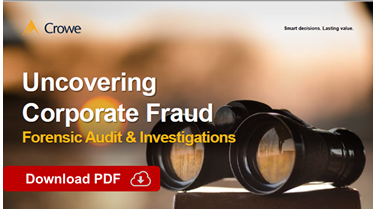
Uncovering Corporate Fraud
Forensic Audit & Investigations

As businesses grow bigger, the span of control lengthens and the supervision of staff becomes more tenuous. When Management is unable to directly monitor and approve all transactions, much is left to senior management. This may lead to oversight and company officials being tempted to engage in fraudulent behavior due to unhealthy desires or situations such as immediate gratification, emergencies at home, high performance targets set by the employer, revenge on the employer, keeping up with the Joneses, etc.
It is a fact that fraud is not easily detected especially if there is collusion between staff and other parties, or the fraud is well concealed. Usually, fraud discovery is due to whistleblower action or when a company encounters an unusual event e.g. a cash crunch. By this time, it may be too late to gain restitution except to ascertain the level of fraud, salvage whatever had been defrauded and bring the culprits to justice.
All of this takes time, effort and professional expertise, not to mention the amount of pain and anguish along the way for all parties involved. Fraud will require forensic audits to uncover the extent of the fraud and to search for evidence. Forensic audits may lead to disputes that require resolution which in turn requires the expertise of lawyers, experts and availability of documents such as those obtained in a forensic audit.
We empathise with these situations and are well aware of the work involved in solving these cases. If you are facing a situation which requires forensic investigations, talk to us – we will be glad to offer clarity and shed light on your predicament.
What are the Types of Fraud?
Fraud can severely impact an organization, causing not only financial repercussions but also irreparable reputational damage. Here are some of the common types of corporate fraud:
Falsification of documents can lead to fraud and cause losses to a company when the fraudulent documents are used to hide losses, inflate costs e.g. through false invoices, or embezzle money from the company e.g. through cheque tampering and false expense claims. Care therefore needs to be taken to authenticate business documents.
Concealment of assets such as objects and property that can be valued in money can be deliberately kept out of sight of the authorities or contending parties, especially in situations when the defending party is facing claims or undergoing bankruptcy proceedings.
Financial reporting fraud occurs when companies manipulate their financial statements to show a false financial position and financial results of the company. Some of the ways of achieving these nefarious ends are by:
- Capturing expenses as capital expenditure and thereby increasing the profit and net asset position of the company
- Overstatement of assets via various methods e.g. by parking expenses or losses in offshore entities
- Understatement of liabilities via various methods in the financial statements
- Inclusion of fictitious assets in the financial statements such as fictitious bank balances or non-existent inventory or property, plant and equipment
- Shifting debt to special purpose entities
Examples of this type of fraud include misappropriation of cash in hand, embezzlement of money via forged cheques, payments to fictitious creditors, payments for fictitious invoices, purchase of phantom assets and direct theft of company assets e.g. inventory and equipment of the company.
Being in a conflict of interest situation will render the decision maker not making a sound and independent judgment in the interest of the company that he is acting for. Many of these situations can arise in practice and it is not uncommon for many company officials to cross this thin line.
An example of this is a company director who sells his private loss making company to his own listed company.


How is Fraud Perpetrated?
Fraud can happen when the right conditions intersect. These conditions may include loopholes in a company’s system, temptation on the perpetrator due to personal needs or lack of limits on the authority of employees to transact on behalf of the company.
Fraud is usually committed in small amounts initially but which grow larger over a period of time. If this fraud is not nipped in the bud, it will gradually grow to strangle the host e.g. cashflow shortages, strangulated balance sheets, poor operating results, etc.
Fraud especially happens in the areas of procurement and bank transactions. Controls therefore need to be especially robust in these areas and may take the form of setting of limits of authority eg for cheque signatories, oversight of all staff’s work, proper segregation of duties, robust physical controls over the assets of the company, implementation of a standard of corporate behavior, use of internal audit function, etc.
Fraud can be committed with the collusion of a group of staff and possibly with the assistance of outside parties. Fraud of this nature is especially insidious and can become extensive and well concealed over an extended period of time. Management can minimize this by adopting a policy of skepticism towards employees whilst auditing them at the same time.
What are the warning signs of fraud?
Fraud is usually preceded by some warning signs or red flags. If noticed early, these indicators can be the trigger to further investigation. Warning signs or red flags include:
- Lack of job segregation and staff supervision
- No independent checking of key transactions
- Missing approval or authorization signatures
- Extensive use of suspense accounts
- Inappropriate and unusual journal entries
- Large cash transactions
- Discrepancy between earnings and lifestyle of management personnel
- Inadequate access control to physical assets and IT security systems
- Abnormal justifications for transactions
- Extensive use of tax havens without clear business justification, along with complex transactions
- Unexpected low levels of cash or assets
- Poor accounting systems with backlog or messy accounts.
Our Experts




